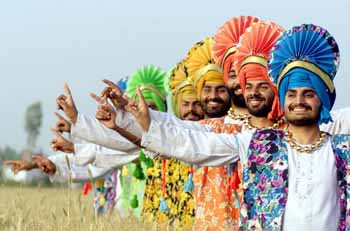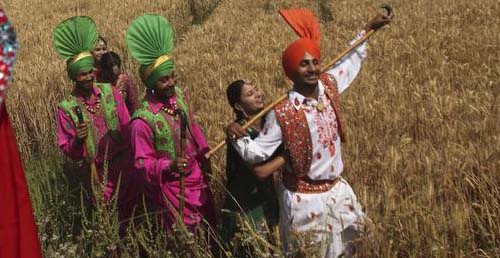|
|
 |
Baisakhi Festival
Baisakhi Festival is a seasonal
festival with a special accent. It is celebrated all over the State on
the first of Baisakh. This is the time when harvest is gathered in and
the farmer exults in the fulfillment of his year's hard work. He joins
the merry-making with full gusto and does not mind walking for miles to
be able to do so. Since this fair is also an expression of prosperity,
singing and dancing constitute its most enchanting features. The Punjab's
famous Bhangra and Giddha are inextricably linked with this festival.
Many fairs in the Punjab
are held near the tombs and shrines of pirs. These fairs must have originated
in a spirit of devotion to those saints and sages. The most famous among
such fairs are the Chhapar fair, the Jarag fair, and the Roshni fair of
Jagranyan |
Baisakhi marks the beginning
of New Year, particularly in the northern part of India. It is among the
few Indian festivals that have a fixed date. Baisakhi is always on April
13th. In Kerala, Baisakhi is called as "Vishu" and in Tamil Nadu, it is
celebrated as "Puthandu".
Considered a holy day, the
devout celebrate the Baisakhi with a dip in the holy rivers just around
the break of dawn. It is on this day that Sun enters Aries, the first sign
of Zodiac. This signifies ushering of the New Year.
In Punjab (the land of Green
Revolution) particularly and in the northern belt of India in general,
farmers perform their own prayers and rejoice. For on this day, they commence
cutting their harvest. The fields can be seen full of nature's bounty.
Dressed in their typical folk attire, both men and women, celebrate the
day with Bhangra and Gidda. Sweets are distributed, old enmities are forgiven
and life is full of joy, merriment and everyone seems to belong.
The above two are the main
reasons for celebrating Baisakhi.
|
Baisakhi, however, has had
a new dimension added to it by Guru Gobind Singh. For it was on the day
of Baisakhi in 1669, that he established the Khalsa Panth and gave a final
impetus to the course of the earlier nine Gurus of Sikhism.
A rural festival of North
India, marking the beginning of the solar year (New year), celebrated in
Punjab with great fervour. For the Sikhs the day is a collective celebration
of New Year along with the commemoration of the founding of the Khalsa
Panth (Sikh brotherhood) by Guru Gobind Singh in 1699.
It also signifies the end
of harvest of the main crop. During Baisakhi the farmers give 'thanks'
to the Lord Almighty for their fortune and pray for a better crop the next
year. Baisakhi involves a lot of socialising where friends and relatives
are invited and delicious meals are served. |
The holy book of the Sikhs,
'Granth Sahib' is taken in a procession, led by the 'Panj Pyaras' (five
senior Sikhs) who are symbolic of the original leaders. The occasion is
celebrated with great gusto at Talwandi Sabo, where Guru Gobind Singh stayed
for nine months and completed the recompilation of the Guru Granth Sahib
and in the Golden temple in Amritsar. On Baisakhi day, water is drawn from
all the sacred rivers of India and poured in to the huge tank surrounding
the golden temple.

|





